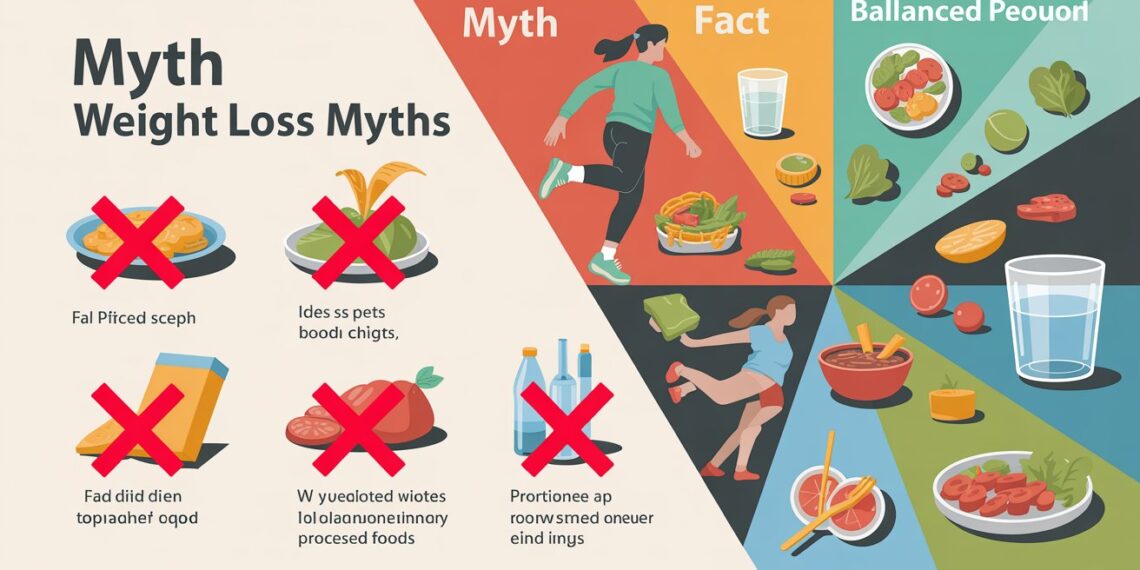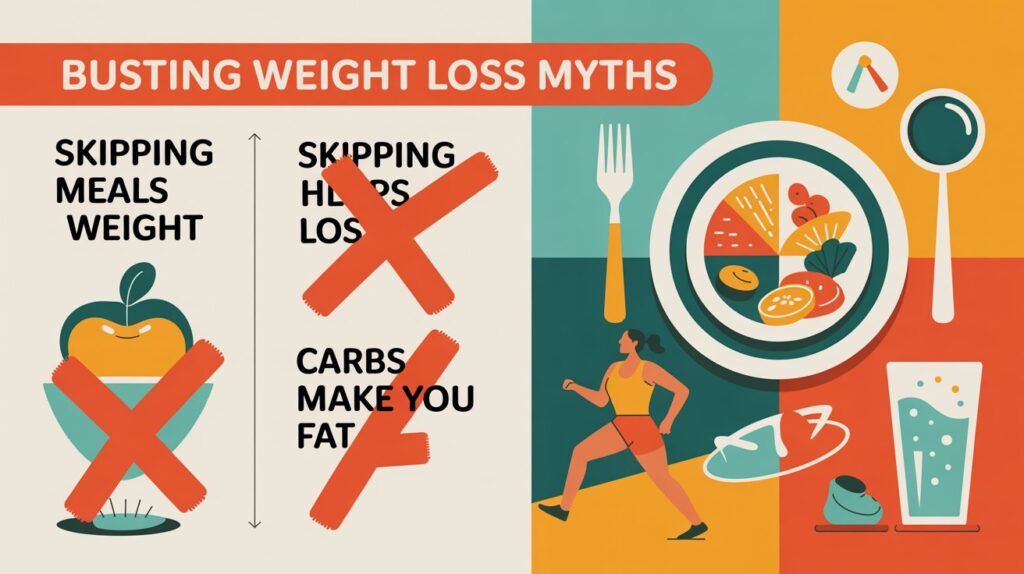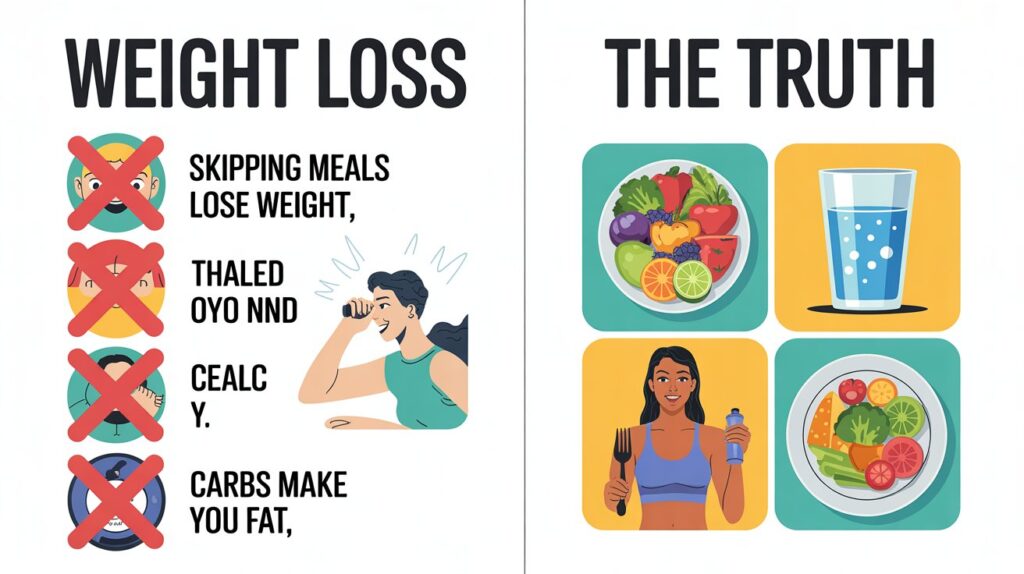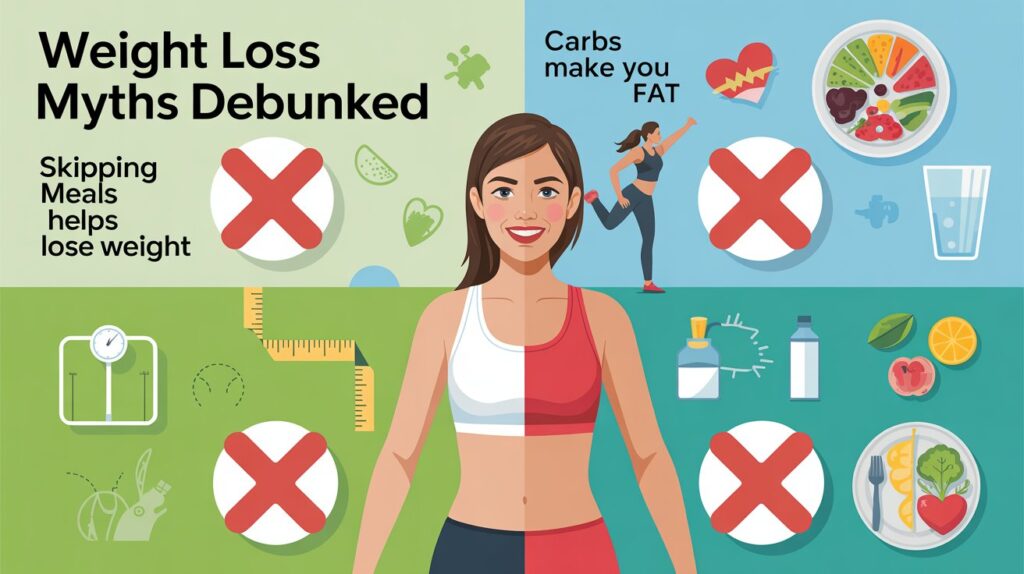The internet is overflowing with quick fixes, miracle foods, and “secret” diet tricks that promise effortless weight loss. Unfortunately, most of these promises are built on half-truths or outright misinformation. Believing them not only stalls progress but can also harm your health and relationship with food.
That’s why we’re cutting through the noise with a science-based guide to the most persistent Weight Loss Myths You Need to Stop Believing. This article will break down common misconceptions, explain what the research actually shows, and offer practical strategies that truly work. By the end, you’ll know which beliefs to leave behind and how to approach weight management with clarity and confidence.
Why Weight Loss Myths Are So Persistent
Weight loss is a billion-dollar industry, and confusion often benefits those selling diets, supplements, or gimmicky programs. Add in social media influencers, outdated nutrition advice, and cultural trends, and it’s no wonder myths stick around.
The truth is: sustainable weight loss is not about magic foods, extreme restrictions, or perfect willpower. It’s about balance, long-term habits, and an understanding of how the body really works.
Myth 1: Carbs Are the Enemy
The Myth
You’ve probably heard it countless times: “Cut carbs, and the pounds will melt away.” Low-carb and keto diets are often promoted as the only path to weight loss.
The Reality
Carbohydrates are your body’s main source of energy. Whole grains, fruits, and legumes provide essential fiber, vitamins, and minerals. Cutting them entirely can leave you feeling sluggish and nutrient-deficient. What really matters is the type of carbs you eat. Refined carbs like white bread and sugary snacks can spike blood sugar, but complex carbs fuel your body and support digestion.
What to Do Instead
-
Prioritize whole grains like quinoa, oats, and brown rice.
-
Include fruits and vegetables in every meal.
-
Pair carbs with protein and healthy fats for steady energy.
Myth 2: Fat Makes You Fat
The Myth
Decades of diet culture taught us to fear fat, with “low-fat” products filling supermarket shelves.
The Reality
Not all fats are created equal. Trans fats and excess saturated fat can be harmful, but unsaturated fats (from foods like olive oil, nuts, avocados, and fish) are crucial for hormone health, brain function, and satiety. Completely avoiding fat can leave you unsatisfied and more likely to overeat later.
What to Do Instead
-
Focus on healthy fats from whole food sources.
-
Use moderation with oils and spreads.
-
Remember that balance—not elimination—is key.
Myth 3: Skipping Meals Helps You Lose Weight
The Myth
Some believe that eating less frequently—like skipping breakfast or lunch—automatically cuts calories and leads to fat loss.
The Reality
Skipping meals often backfires. Hunger builds, leading to overeating later in the day. Skipping breakfast has been linked to poor energy, reduced concentration, and nutrient deficiencies. While intermittent fasting can work for some people, it’s not simply about skipping meals—it requires a structured eating pattern and nutrient-dense food choices.
What to Do Instead
-
Eat balanced meals spaced throughout the day.
-
Include protein and fiber to stay full longer.
-
If experimenting with fasting, do so mindfully and under professional guidance.
Myth 4: Eating After 7 p.m. Causes Weight Gain
The Myth
The clock strikes seven, and suddenly, any food is destined to turn into body fat—or so the myth goes.
The Reality
Weight gain isn’t about when you eat; it’s about how much and what you eat overall. Late-night snacking can be a problem if it adds excess calories (often from processed foods), but eating dinner at 8 p.m. isn’t inherently harmful. Night-shift workers and those with different schedules prove this daily. Weight Loss Myths You Need to Stop Believing | Science-Based Guide.
What to Do Instead
-
Pay attention to calorie balance across the entire day.
-
Choose lighter evening snacks like fruit, yogurt, or nuts.
-
Avoid mindless eating in front of screens.
Myth 5: Crash Diets Work for Long-Term Weight Loss
The Myth
Lose 20 pounds in 20 days! Rapid crash diets promise big results with tiny calorie counts.
The Reality
While crash diets can cause initial weight loss, most of it comes from water and muscle, not fat. These diets slow your metabolism and are nearly impossible to sustain. Once you return to normal eating, weight usually rebounds—and sometimes increases beyond the starting point.
What to Do Instead
-
Aim for gradual weight loss (1–2 pounds per week).
-
Focus on sustainable lifestyle changes.
-
Prioritize nutrient density over extreme restriction.
Myth 6: You Must Completely Cut Out “Bad” Foods
The Myth
To lose weight, you must give up desserts, fried foods, or your favorite snacks forever.
The Reality
Total restriction often leads to cravings, guilt, and binge eating. Successful long-term weight loss includes flexibility. You can enjoy treats in moderation without derailing progress.
What to Do Instead
-
Practice the 80/20 rule: 80% nutritious choices, 20% enjoyment foods.
-
Savor small portions of indulgent foods.
-
Focus on progress, not perfection.
Myth 7: Exercise Alone Is Enough for Weight Loss
The Myth
Some people hit the gym hard, believing workouts alone will make the pounds disappear.
The Reality
Exercise is incredibly important for health, but it’s only part of the picture. Research shows that diet has a stronger influence on weight loss than exercise alone. For best results, combine a balanced diet with regular physical activity.
What to Do Instead
-
Pair cardio and strength training with mindful eating.
-
Use exercise for health, mood, and fitness—not just calorie burn.
-
Remember: You can’t out-train a poor diet.
The Scale Is the Only Measure of Success
The Myth
If the number on the scale doesn’t move, you’re failing.
The Reality
The scale doesn’t tell the full story. Water retention, hormonal shifts, and muscle gain can all affect weight. Non-scale victories—like better energy, improved sleep, stronger workouts, and looser clothing—are often more meaningful indicators of progress.
What to Do Instead
-
Track multiple metrics: measurements, strength, energy, and mood.
-
Use progress photos and journals.
-
Celebrate lifestyle improvements, not just pounds lost.
Myth 9: Willpower Alone Determines Weight Loss Success
The Myth
“If you just had more discipline, you’d lose weight.”
The Reality
This belief ignores biology, psychology, and environment. Genetics, hormones, stress, sleep, and social factors all affect weight. Blaming willpower alone oversimplifies a complex process and can create shame.
What to Do Instead
-
Focus on building supportive habits.
-
Manage stress, prioritize sleep, and seek accountability.
-
Recognize that setbacks are part of the journey.
Supplements and Detoxes Are Essential
The Myth
Teas, pills, and powders promise rapid fat burning or “detoxification.”
The Reality
Your body already has powerful detox systems: your liver, kidneys, and lungs. Most supplements marketed for weight loss lack solid evidence and may even be unsafe.
What to Do Instead
-
Skip detox gimmicks and focus on whole foods.
-
Talk to a doctor before starting any supplement.
-
Remember: There are no shortcuts.
FAQs About Weight Loss Myths
Q1: Why do weight loss myths spread so easily?
Because they’re simple, appealing, and often promise quick results. Misinformation spreads faster than nuanced science.
Q2: Can intermittent fasting work for weight loss?
Yes, but it’s not magic. It works by creating a calorie deficit and may support appetite control for some people. The quality of food and overall balance still matter.
Q3: How important is metabolism in weight loss?
Metabolism plays a role, but lifestyle factors—like diet quality, physical activity, sleep, and stress—are often more impactful than small differences in metabolic rate.
Q4: Is there one “best” diet for weight loss?
No single diet works for everyone. The best approach is one that fits your lifestyle, provides adequate nutrition, and is sustainable long term. Weight Loss Myths You Need to Stop Believing | Science-Based Guide
Conclusion
When it comes to losing weight, the biggest obstacle isn’t your metabolism or lack of discipline—it’s misinformation. From carb fear to crash diets, these myths distract from the real solution: consistent, balanced habits supported by science.
By letting go of these Weight Loss Myths You Need to Stop Believing, you free yourself from unsustainable cycles of guilt and frustration. Instead, you can focus on nourishing your body, moving in ways you enjoy, and building long-term habits that support health and confidence.
Sustainable weight loss isn’t about shortcuts or extremes—it’s about patience, persistence, and a realistic understanding of how the body works. Leave the myths behind, and step into a healthier, more informed future.












